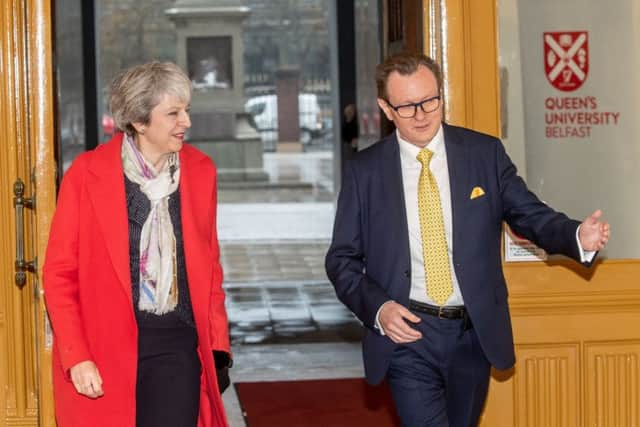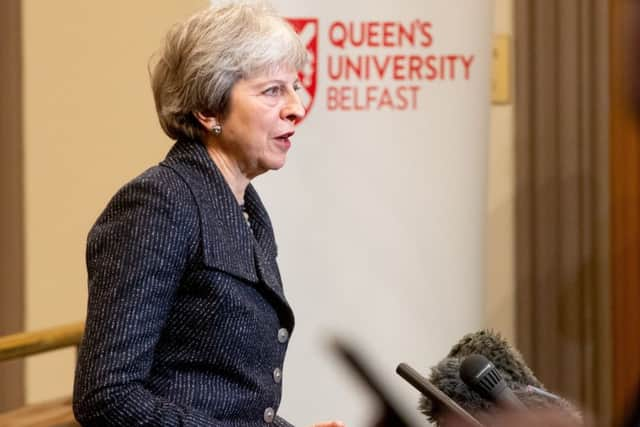Brexit border backstop is only meant to be temporary, Theresa May says in Belfast '” but DUP is not convinced
and live on Freeview channel 276
Theresa May was speaking in response to a News Letter question about the controversial backstop, which is strongly opposed by the DUP but which has been incorporated in the Withdrawal Agreement with the EU.
Nigel Dodds told this newspaper after the DUP conference at the weekend that Tory backbench opposition to the backstop was growing, and Arlene Foster told the media yesterday that opposition to that Withdrawal Agreement at Westminster was “coalescing” around the backstop.
Advertisement
Hide AdAdvertisement
Hide AdWe asked Mrs May about a letter that Boris Johnson sent her earlier this year, reported in The Times on Monday, in which the then foreign secretary appeared to consider checks in the Irish Sea as one solution to the land border problem. Mr Johnson delighted DUP delegates at their conference when, in contrast to any acceptance of an internal UK border, he called for the backstop to be ditched.


Mrs May told us yesterday that “everyone is clear that even if the backstop is invoked it is only intended to be temporary. There is various elements throughout the Withdrawal Agreement that make that absolutely clear”.
Her full answer is set out below.
However, it will not reassure critics who say that the arrangement is in theory temporary but will apply until the European Union assents to a different arrangement or agrees a trade deal, and that they will never agree to anything that does not in effect leave Northern Ireland in the EU customs and regulatory zone.
Any such agreement has to be unanimous between all 27 European Union countries, and would need the assent of the Republic of Ireland, which has made clear that it will not accept divergence on those matters.


Advertisement
Hide AdAdvertisement
Hide AdThe News Letter also asked Mrs May about paragraph 50 of the backstop, which was inserted last December days after the DUP opposed the initial version of the backstop, and which appeared to rule out an Irish Sea border.
Paragraph 50 read: “In the absence of agreed solutions, as set out in the previous paragraph, the UK will ensure that no new regulatory barriers develop between Northern Ireland and the rest of the UK, unless, consistent with the 1998 Agreement, the Northern Ireland Executive and Assembly agree that distinct arrangements are appropriate... In all circumstances, the UK will continue to ensure the same unfettered access for Northern Ireland’s businesses to the whole of the UK internal market.”
However, the Alliance Party, Green Party, SDLP and Sinn Fein have jointly lobbied Brussels, including the EU chief negotiator, Michel Barnier, against allowing Stormont such a power.
In February and March, when the EU set out its legal interpretation of the backstop, paragraph 50 was not mentioned or legislated for. The prime minister opposed the EU interpretation and said that no prime minister of the UK could agree such a commitment, which would create an internal UK border.
Advertisement
Hide AdAdvertisement
Hide AdAsked yesterday why since then the government had abandoned paragraph 50, which had given reassurance to unionists, Mrs May adopted a number of arguments.
First she said that “what arrangements we put in place in the United Kingdom for determining whether there should be any regulatory divergence is actually a matter for us”.
She then pointed to regulatory checks that already exist in the Irish Sea (they are in relation to livestock).
Mrs May then implied that the UK would not diverge in many regulations from the EU in any event ahead of a trade deal in which it might have to match such regulations.
Advertisement
Hide AdAdvertisement
Hide AdThe prime minister also noted that the Assembly is not functioning: “Obviously at the moment we don’t have a Stormont Executive and Assembly, we continue to work to get one in place because I think that is the best position for Northern Ireland to be in, to have its devolved administration in place.”
Critics of this argument had dismissed it because the backstop, including paragraph 50, was agreed when Stormont was suspended so if that argument applies now, it also applied when the paragraph was agreed.
We were unable to ask Mrs May about this apparent inconsistency in her position with regard to paragraph 50, because the regional press were all allowed only two questions each.
The full text of her answers to the News Letter is laid out below.
Advertisement
Hide AdAdvertisement
Hide AdThe News Letter questions with the prime minister and her answer were as follows:
Question: Prime Minister, The Times reported yesterday that Boris Johnson earlier this year had sent you a letter considering solutions to the Irish border, one of which was checks in the Irish Sea. You have stated your own unionism. Have you not presided over a situation in which [under] another prime minister, be it for example a Brexiteer who is determined above all else to get a deal for England, or a sympathetic to Irish republican prime minister, Northern Ireland cannot get free of the customs union?
Answer: No, if we just look at the backstop and why it is there.
First of all, all sides are clear that we want to work, and there are clauses in the legal Withdrawal Agreement on best endeavours and so forth and the action that can be taken if best endeavour aren’t used to get the future relationship finalised by December 2020, such that there is no need to use any interim period, to guarantee no hard border between Northern Ireland and Ireland.
Advertisement
Hide AdAdvertisement
Hide AdThe backstop will only be considered, and it is not an automatic even in these circumstances, the backstop will only be considered if it is the case, that there is a short period of time, a temporary period, when it is necessary to continue to — when the future relationship is not in place, so we need some other way of continuing to guarantee no hard border between Northern Ireland and Ireland — as I say in that period, it doesn’t have to be the backstop it could be an extension to the implementation period, the transition period as it is referred to in the Withdrawal Agreement, but everyone is clear that even if the backstop is invoked it is only intended to be temporary. There is various elements throughout the Withdrawal Agreement that make that absolutely clear.
Q: But prime minister you didn’t even try to apply paragraph 50 [of the 2017 backstop in the Joint Report] which gave a lot of unionists here reassurance and is one of the reasons why there was no uproar after the revised backstop of last December.
A. Well paragraph 50 refers to what you could call the Stormont lock, the issue of — if I could just address the issue, because there is a wider answer to the issue on regulation — but, um, that was about regulatory divergence requiring the approval of Stormont.
Now what arrangements we put in place in the United Kingdom for determining whether there should be any regulatory divergence is actually a matter for us.
Advertisement
Hide AdAdvertisement
Hide AdObviously at the moment we don’t have a Stormont executive and assembly, we continue to work to get one in place because I think that is the best position for Northern Ireland to be in, to have its devolved administration in place. In terms of regulatory divergence, of course there already is regulatory divergence today between Northern Ireland and Great Britain in some limited areas.
If you look at a temporary period of a backstop, and I have said and have said it in the House of Commons, I am looking to see how I can give reassurance on this, during the temporary period of the backstop it actually wouldn’t make any real sense for Great Britain, for the UK government to say that Great Britain should diverge in regulations which we might then be entering back into in the future relationship.
So there is some I hope some reassurance there that I am looking at what reassurance I can give that actually wouldn’t see that extra regulatory divergence that everyone is concerned about.
We have that regulatory divergence today, we are one United Kingdom but there is an exception for the particular position of Northern Ireland in the regulations as they are applied today.
[All papers were allowed only two questions]